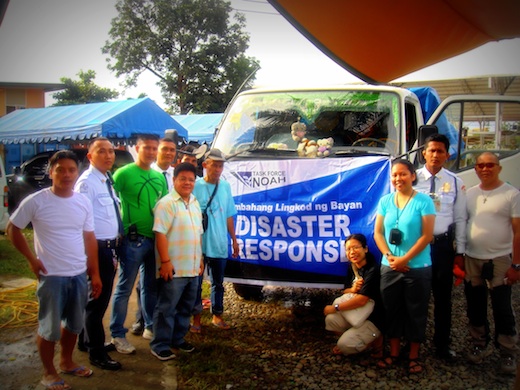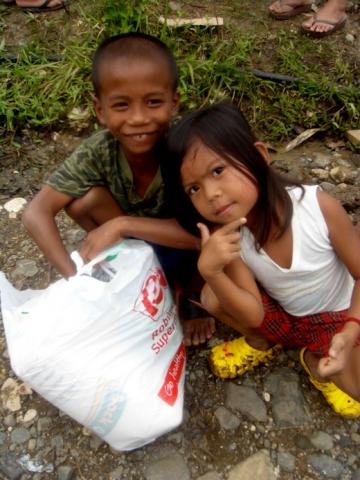Simbahang Lingkod ng Bayan (SLB), the socio-political arm of the Jesuits in the Philippines, and Ateneo de Davao University recently organized a relief and recovery programme for survivors of Typhoon Pablo, known internationally as Typhoon Bopha. Held on January 8 and 9, the relief programme, Task Force Noah: Pablo, served 1,000 affected families in Compostela Valley. The team was also able to get support from the Tribal Council of each municipality.
Typhoon Pablo struck the southern Philippine island of Mindanao in December 2012, causing widespread destruction as it crossed the southern and central regions, cutting off power in two provinces and triggering landslides and flooding. The category 5 super typhoon left thousands homeless and more than 1,200 dead.
More than P26.5 billion worth of agriculture (mostly in the banana producing provinces) was destroyed. The total damage wreaked by Pablo is estimated to be almost US$1 billion, according to Impact Forecasting’s December report on global catastrophes in 2012, “Global Catastrophe Recap”. The hardest hit provinces are Davao Oriental and Compostela Valley. In Compostela Valley alone, 655,373 people were affected.

 Lui Morada, SLB’s programme manager for disaster risk reduction and management, and Lyra Verzosa, visited the affected communities, and distributed food, water and hygiene packs as they conducted a preliminary survey on how SLB can help. Lyra, a psychologist and volunteer with SLB’s psycho-social intervention programme called SiLaBan, also focused on their psycho-social needs.
Lui Morada, SLB’s programme manager for disaster risk reduction and management, and Lyra Verzosa, visited the affected communities, and distributed food, water and hygiene packs as they conducted a preliminary survey on how SLB can help. Lyra, a psychologist and volunteer with SLB’s psycho-social intervention programme called SiLaBan, also focused on their psycho-social needs.
Together with volunteers from Ateneo de Davao, the team conducted relief operations in the two mountainous barangays of Compostela Valley that were severely affected by Pablo – Brgy Casoon in the municipality of Monkayo and Brgy Prosperidad in the municipality of Montevista. These barangays are inhabited mainly by the Lumad, who depend on subsistence farming for their livelihood. Both villages are among the least served communities in Compostela Valley because of their location. Getting to them requires at least an hour’s drive uphill, off the main highway and via unpaved and steep roads. In Brgy Prosperidad, only a 2-wheeled vehicle called a Skylab can manage the road because of thick mud and damaged bridges.
The affected communities in Compostela Valley will need more support in the next 12 months. It will take time for the people to rehabilitate their land so that they can begin subsistence farming again. In the meantime, they will need food and other basic services. In response to this, SLB will soon send a second wave of assistance with food relief.
For more information on SLB’s relief programme for survivors of Typhoon Pablo (Bopha), visit www.slb.ph or email SLB at information@slb.ph.

